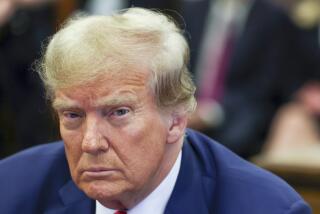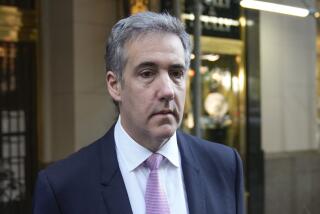Lewinsky Yields Nothing New, Sources Say
- Share via
WASHINGTON — After questioning Monica S. Lewinsky for four hours Monday, a House Republican prosecutor unearthed no significant new impeachment evidence against President Clinton, while White House lawyers offered her a presidential apology for “what you have had to go through,” sources familiar with the session said.
The results in the first of three depositions this week suggested that the prosecution team was unable to buttress its charge that Clinton, in trying to keep secret his affair with Lewinsky, obstructed justice by allegedly trying to influence the former intern’s testimony in the Paula Corbin Jones sexual harassment lawsuit against him.
“She was pretty much trying to protect the president,” said a House aide who was briefed on Monday’s session. “She didn’t want to give the managers anything they could use.”
Added another House source: “She just reaffirmed her grand jury testimony. There was no wavering from that. My understanding is there was not any considerable new ground broken.”
White House lawyers did not question Lewinsky, a decision that also indicated no new ground was broken in the case. It prevented the House prosecutor, Republican Rep. Ed Bryant of Tennessee, from posing rebuttal questions.
Instead, Nicole Seligman, a private attorney for Clinton, read a short statement.
Sources said that the statement was not a direct apology for anything the president had done but rather expressed regret that Lewinsky had become publicly ensnarled in the scandal. One source in the room at Washington’s Mayflower Hotel said it was Seligman who told Lewinsky that Clinton was “sorry for what you have had to go through.”
Also Monday, Clinton attorney David E. Kendall went to federal court asking for sanctions against independent counsel Kenneth W. Starr for allegedly leaking information to the press. Kendall’s complaint was sparked by a story in the New York Times on Sunday that said Starr, according to unnamed associates, has concluded that he has the constitutional authority to indict Clinton for perjury and obstruction of justice even before he leaves the White House in January 2001. The story added that Starr had not decided whether to pursue such a course.
In a statement released Monday, Starr denied wrongdoing in the matter and said that he has launched “an internal investigation to determine whether anyone in this office improperly disclosed the information.”
The statement added: “The announcement of this investigation should not be taken as confirmation of anything in the article.”
Today, Clinton confidant Vernon E. Jordan Jr. will answer a House prosecutor’s questions at the Capitol, followed by questioning Wednesday of White House aide Sidney Blumenthal.
The three depositions were approved on a virtual party-line vote by the Senate last week after House managers argued that the testimony could help prove their case against Clinton.
A series of votes last week, including the one on depositions, made it clear that there is almost no chance that the necessary 67 senators will vote to convict Clinton in the 100-member Senate and remove him from office. The prosecutors’ main hope was that the testimony from Lewinsky, Jordan or Blumenthal would somehow alter that equation.
Against that backdrop, and amid heavy security, the questioning of Lewinsky began just after 9 a.m. EST. Bryant had been named last week to handle the questioning for the 13-member House team. Leading the White House team were Seligman and White House Deputy Counsel Cheryl Mills.
A Republican senator and Democratic senator sat in to monitor the session and rule on objections.
The session, which included a lunch break and several short recesses, ended at 3:14 p.m.
Participants were prohibited from publicly commenting on the proceeding but afterward sources said that Bryant focused most of his queries on whether Clinton had obstructed justice by encouraging Lewinsky to file a false affidavit in the Jones lawsuit and whether he and Jordan helped her find a new job in return for her silence.
Lewinsky previously testified 22 times to Starr’s grand jury. During those appearances, she denied that the president had encouraged her to lie in the Jones case or that the job search represented a payoff to her.
Bryant also wanted to know more about whether Clinton was directly involved in attempts to hide gifts that he had given Lewinsky.
“The questions focused on the obstruction of justice issues,” said one source. “My understanding is that she just reaffirmed her grand jury testimony.”
In a short statement released by his office, Bryant said simply: “I was pleased with today’s events and felt it was a productive session.”
Sources offered differing versions of Lewinsky’s demeanor during the questioning.
“She was not in any mood to give the House managers anything,” said an aide to the prosecution team. “She was kind of snippy.”
Others portrayed her as calm and cooperative.
“She was a very good, very cool witness,” said one participant.
Said another source in the room: “She was confident. She’s a class act. She’s intelligent. She was very together.”
The videotape and a transcript of the deposition are to be filed this morning in a closed room in the Capitol, where senators may view and inspect the material.
Similar arrangements will be made for the Jordan and Blumenthal depositions. When the trial reconvenes Thursday, the Senate will face a decision on whether to publicly release any of the materials.
Also to be decided by senators is whether the three witnesses should be called to testify in person, whether prosecutors will be allowed to call additional witnesses and whether the White House, if it wants, can call witnesses.
During the questioning of Lewinsky, she was flanked by her attorneys. Sources said that occasionally she would provide long-winded answers, prompting one of her lawyers to tap her on the elbow while another might give her a hand signal.
The request that White House lawyer Kendall filed Monday in federal court asked that Starr be required to demonstrate why he and his staff “should not be held in contempt for improper violations of grand jury secrecy.”
Over the course of the last year, the White House has repeatedly criticized Starr’s team for leaking to the media and U.S. District Judge Norma Holloway Johnson issued an order finding that Starr’s office apparently had violated secrecy rules governing grand juries.
Starr, asked outside his home if he planned to seek an indictment of the president, said: “It is premature for us to be commenting at all on this, so we’re not going to comment. There’s a process that is underway and that process should go forward, the process that’s under way in the U.S. Senate.”
The news that Starr had decided he could seek an indictment of Clinton while the president remains in office had sparked a fresh round of criticism of the independent counsel from Democratic senators, who accused him of trying to influence the impeachment trial.
Charles G. Bakaly III, Starr’s spokesman, said Monday: “We have no interest in interposing ourselves in the Senate’s business.”
Bakaly also said that Starr had not concluded whether he “has the constitutional authority to indict Clinton as a sitting president.”
“We have the utmost respect for the Senate and its process that is underway right now,” Bakaly said. “This is a political process and then, after that is resolved, the focus shifts to a legal process. We’re in the legal business not in the political business.”
Times staff writers Geraldine Baum, Edwin Chen, Robert L. Jackson, Heidi Sherman and Elizabeth Shogren contributed to this story.
More to Read
Sign up for Essential California
The most important California stories and recommendations in your inbox every morning.
You may occasionally receive promotional content from the Los Angeles Times.














